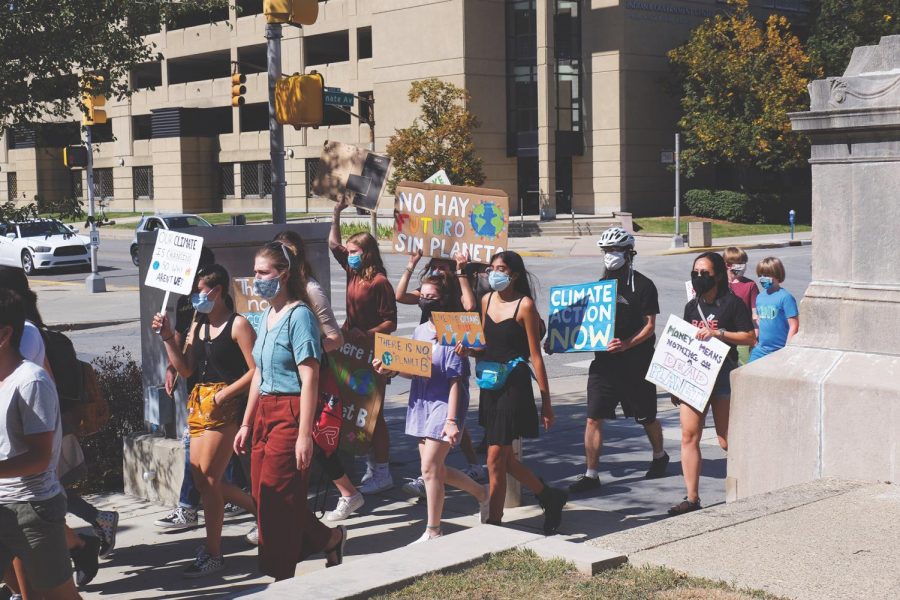For Maanya Rajesh, Green Action Club president and junior, environmental conservation has never been more important, even during the COVID-19 pandemic.
“The pandemic hasn’t really made that much of a difference; if anything, it’s accelerated everything that’s happening because industries are needing to work harder to start employing people and get their output back up,” she said. “Emissions are only going higher and higher right now.”
Rajesh isn’t alone in her view. A poll conducted by the Pew Research Center in October found that 70% of people in 14 countries said climate change was a major threat, while 69% said the spread of infectious diseases was a major threat, indicating that almost the same amount of people prioritize climate change equally with pandemic-level viruses.
According to Brandy Yost, IB Environmental Systems and Societies teacher, the pandemic demonstrated the massive impact humans have on the environment.“I view what is happening with climate change as being very serious and something that—pandemic or no pandemic—we should not be taking lightly,” she said. “When the world did stop for a month, we did see improvements in carbon emissions, which shows how drastically humans are affecting carbon emissions just from driving.”
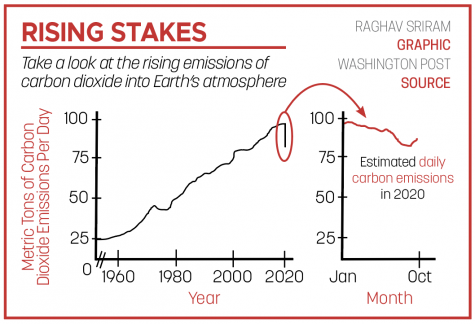
Rajesh said she agreed.
“There were a lot of stories that came out earlier this year saying that the lockdown has really helped the environment, air quality has improved and the beaches are cleaner. But really, once the lockdown ended, all those emissions just went back to normal,” Rajesh said. “It doesn’t really make a difference to be living our lives just the way we were pre-pandemic. Now it really needs to be our priority to try to get our emissions down, regardless of whether there is or isn’t a pandemic. The issue is still there.”
Geetika Chitturi, the president of SWENext (a women’s engineering club) and sophomore, said she hopes her club will participate along with other CHS clubs in a tree-planting project in downtown Carmel with TreePlenish, a nationwide environmental conservation organization, in the spring.
Chitturi said she hopes the project will help emphasize the teamwork aspect of conservation.
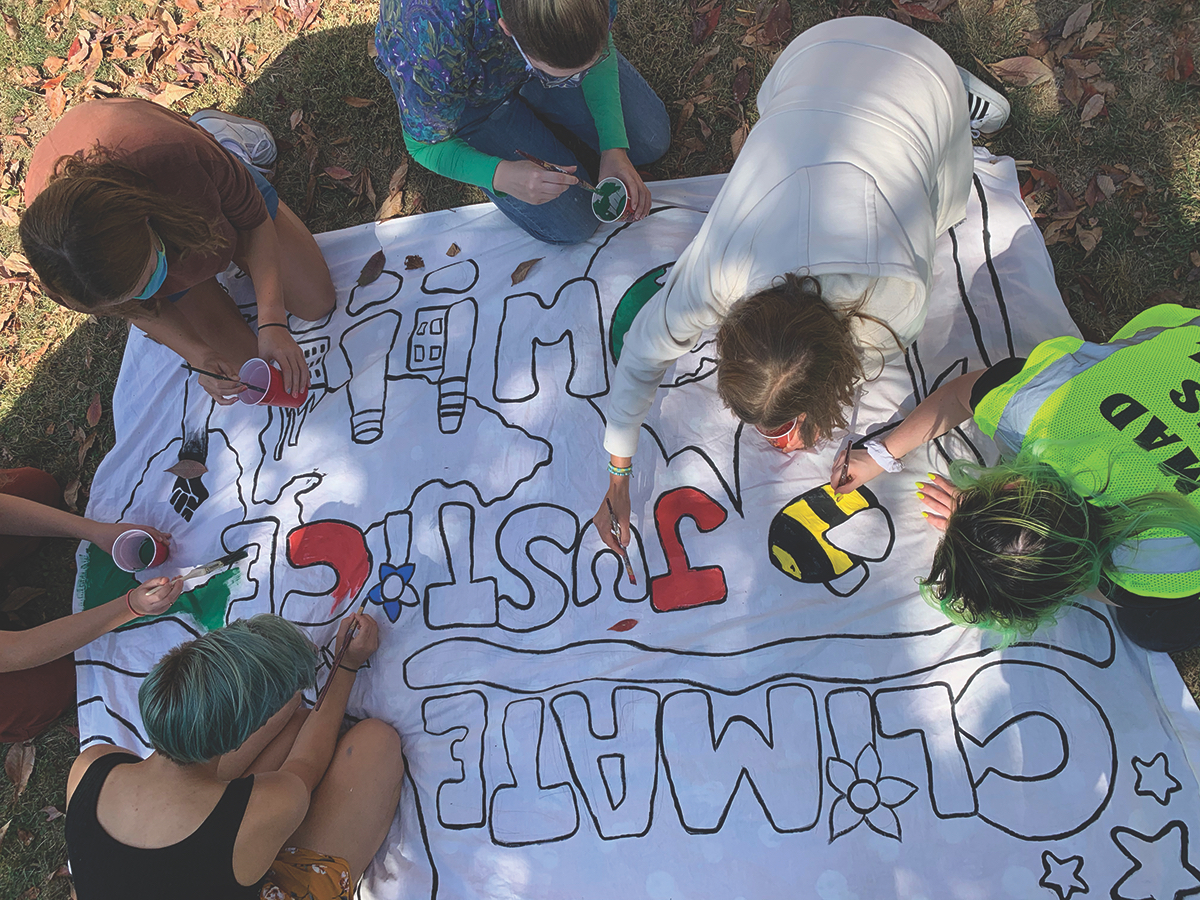
“Because we will be working with so many other clubs, I think this sends the message that we do have to work together in order for us to be able to help the environment; we can’t go on our own ways and expect that we will be able to have as positive of an impact as we would if we worked together,” Chitturi said.
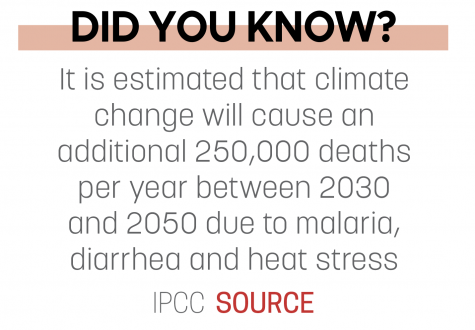
“I just hope to bring the community together to work towards a bigger goal and to help the environment because it is struggling so much,” she added. “CHS, being a school with over 5,000 kids, definitely has a significant impact on the environment, so I hope that we can lessen that. (Conservation) is still important during the pandemic because Earth is having an ecological crisis.”
 Although efforts like tree planting have become popular in attempting to balance consumption with conservation, Yost pointed out that some of the most efficient efforts to stop climate change can be through public policy.
Although efforts like tree planting have become popular in attempting to balance consumption with conservation, Yost pointed out that some of the most efficient efforts to stop climate change can be through public policy.
“I would love to see changes in policy really moving towards renewable energy—an electric car today is still coming from coal,” she said. “If we can make that switch over, that could really benefit the environment.
“With a lot of regulations we had, we were seeing improvement and we were on track to meet our goals. Politics plays a huge role in this, and the current administration rolled back a lot of the regulations, which put us behind (on our expected progress).”
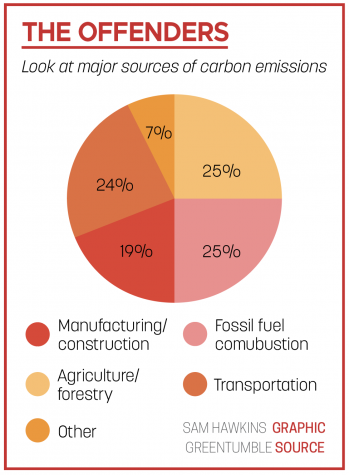
Rajesh said the Green Action Club has been working with local governments to help write a policy that may be drafted by the end of the year.
“We’re working with the City Council and the Mayor on a climate action plan–kind of like the Green New Deal, but a little less aggressive,” she said. “Our draft will be done in December, and we’re going to try to implement that next year. That’ll basically set a bunch of goals for Carmel.”
Rajesh said she hopes steps such as the climate action plan will continue to motivate students to vouch for conservation, despite the limitations incurred by the pandemic.
“There are some positives, but getting people to turn out to our events, or having motivation for students in our club to continue pushing their projects, has been a little hard. We’re getting a lot of ‘no’s’ right now, because the focuses are on the pandemic, and we totally get that. We’re trying to navigate around this whole situation,” she said. “We’re still able to work on the climate action plan, which is still in the stage of drafting it and writing it. We’re just trying to really get past this stage.”
Yost said, “I do think there is hope for change. There is a lot of activism here, and I think they’re doing a lot of good things. There are a lot of different organizations that have really stepped up. I see Carmel as being on the forefront.
“(Carmel) Mayor (James) Brainard has been on board with making a lot of changes and being on board with environmental changes,” she added, “and he understands the importance of that and how it can benefit our community. I think what he has done with roundabouts has been brilliant. As a community, we are definitely ahead of the ball game.”































![What happened to theater etiquette? [opinion]](https://hilite.org/wp-content/uploads/2025/04/Entertainment-Perspective-Cover-1200x471.jpg)














































![Review: “The Immortal Soul Salvage Yard:” A criminally underrated poetry collection [MUSE]](https://hilite.org/wp-content/uploads/2025/03/71cju6TvqmL._AC_UF10001000_QL80_.jpg)
![Review: "Dog Man" is Unapologetically Chaotic [MUSE]](https://hilite.org/wp-content/uploads/2025/03/dogman-1200x700.jpg)
![Review: "Ne Zha 2": The WeChat family reunion I didn’t know I needed [MUSE]](https://hilite.org/wp-content/uploads/2025/03/unnamed-4.png)
![Review in Print: Maripaz Villar brings a delightfully unique style to the world of WEBTOON [MUSE]](https://hilite.org/wp-content/uploads/2023/12/maripazcover-1200x960.jpg)
![Review: “The Sword of Kaigen” is a masterpiece [MUSE]](https://hilite.org/wp-content/uploads/2023/11/Screenshot-2023-11-26-201051.png)
![Review: Gateron Oil Kings, great linear switches, okay price [MUSE]](https://hilite.org/wp-content/uploads/2023/11/Screenshot-2023-11-26-200553.png)
![Review: “A Haunting in Venice” is a significant improvement from other Agatha Christie adaptations [MUSE]](https://hilite.org/wp-content/uploads/2023/11/e7ee2938a6d422669771bce6d8088521.jpg)
![Review: A Thanksgiving story from elementary school, still just as interesting [MUSE]](https://hilite.org/wp-content/uploads/2023/11/Screenshot-2023-11-26-195514-987x1200.png)
![Review: "When I Fly Towards You", cute, uplifting youth drama [MUSE]](https://hilite.org/wp-content/uploads/2023/09/When-I-Fly-Towards-You-Chinese-drama.png)
![Postcards from Muse: Hawaii Travel Diary [MUSE]](https://hilite.org/wp-content/uploads/2023/09/My-project-1-1200x1200.jpg)
![Review: "Ladybug & Cat Noir: The Movie," departure from original show [MUSE]](https://hilite.org/wp-content/uploads/2023/09/Ladybug__Cat_Noir_-_The_Movie_poster.jpg)
![Review in Print: "Hidden Love" is the cute, uplifting drama everyone needs [MUSE]](https://hilite.org/wp-content/uploads/2023/09/hiddenlovecover-e1693597208225-1030x1200.png)
![Review in Print: "Heartstopper" is the heartwarming queer romance we all need [MUSE]](https://hilite.org/wp-content/uploads/2023/08/museheartstoppercover-1200x654.png)



